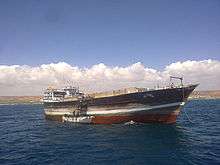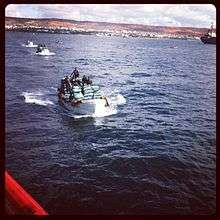Barawa
| Barawa Baraawe مدينة ﺑَﺮَﺍﻭَة | |
|---|---|
| City | |
|
The Barawa seafront. | |
| Nickname(s): Brava Ierè | |
 Barawa Location in Somalia. | |
| Coordinates: 1°06′48″N 44°01′49″E / 1.11333°N 44.03028°ECoordinates: 1°06′48″N 44°01′49″E / 1.11333°N 44.03028°E | |
| Country |
|
| Region | Lower Shebelle |
| District | Barawa |
| Government | |
| Population | |
| • Total | 32,800 |
| Time zone | EAT (UTC+3) |
| Area code(s) | +25261 |
Barawa (Somali: Baraawe, Arabic: مدينة ﺑﺮﺍﻭة), also known as Brava, is a port town in the southwestern Lower Shebelle region of Somalia. Barawa is the capital of southwestern Somalia state
History
Medieval
In the 16th century, Barawa, which was then part of the Ajuran Empire, was sacked by the Portuguese during the Battle of Barawa but quickly recovered from the attack.[1] In 1840, soldiers of the Bardheere Jama'a took the city under siege while attempting to discover a more direct sea route, and inflicted much damage. The town's inhabitants pleaded with Sultan Yusuf Mahamud Ibrahim of the Geledi Sultanate for protection, with the Sultan's troops then invading Bardera and burned the city to the ground.
Eventually, in 1889, Barawa was ceded to the control of the Italians when the Sultan of Zanzibar was forced to agree to the annexation of all the Banadir ports to the Italian Company already established in the Horn of Africa. The city, however, like the rest of the Benadir coast, was not under Zanzibari control but under Gobroon and Bimal rule, therefore making the Italian-Zanzibar agreement null and void. The Italians faced stiff resistance from many parts of the Benadir coast, and its inland regions and the slave trade of the Somali merchants would remain unchallenged for years to come.[2]
Sheikh Uways al-Barawi organized an Ikhwaan and led the Banadir revolt, which was duly crushed in 1908.[3]
Contemporary
Italians developed "Brava" in the 1920s and 1930s: the first thing they did was to abolish slavery. Then they created the first sewage of the city and established a small hospital (the first in the whole area). In Brava there was a small school in the late 1930s, the first public elementary school in southern Banadir.
In addition to the famous Sheikh Uways, Baraawe has produced numerous well respected Ulama including Sheikh Nureini Sabiri, Sheikh Qassim al-Baraawi, Sheikh Ma'llim Nuri, Sharif Qulatayn and a female poet-saint, Dada Masiti.[4] The city was the stronghold of the Hizbiya Digil-Mirifle (HDM) party, which was founded in 1947 and later became the Hizb al-Dastuur Mustaqil al-Somali (Somali Independent Constitutional Party, HDMS)[5]
Politics
In 2009, Al-Shabaab militants seized control of Barawa.[6] In September of the year, a United States military raid in the area killed Saleh Ali Saleh Nabhan, a suspected Al-Qaeda operative.[6] In October 2013, United States Navy SEAL Team Six also launched an unsuccessful raid against a beachside house in Barawa, targeting Mukhtar Abu Zubeyr, then leader of Al-Shabaab.[7] Following the unsuccessful raid, al-Shabab began a crack down of the town.[8]
Following the launch of Operation Indian Ocean, the Somali Armed Forces assisted by AMISOM troops re-seized control of Barawa from Al-Shabaab in October 2014.[9] On October 11, during a trip to Barawe President Hassan banned charcoal trade in the city.[10]
Demographics
Barawa has a population of around 32,800 inhabitants.[11] The broader Barawa District has a total population of 57,652 residents.[12]
The town's traditional inhabitants are the Tunni clan of the Somali people[13] as well as the Bravanese. In addition to Standard Somali, the Tunni speak Af-Tunni (another Afro-Asiatic language) and the Bravanese speak Chimwiini (a dialect of Swahili).[14]
Gallery
 Charcoal in the port |
 Exporting Charcoal by Indian boat |
 small volvos carriying Charcoal to the ship |
 Pakistani in barava on their coal trade boat  volvo boat loading coal to the big boat, |
|---|---|---|---|
 Barawa beach |
 Small fish boats |
 Charcoal in the port waiting export |
References
- ↑ Barbosa, 1866, p. 15 (originally from about 1517)
- ↑ The End of slavery in Africa By Suzanne Miers, Richard L. Roberts
- ↑ The Sheikh subsequently migrated to Biyoley to reorganize his Ikhwan, but was killed in 1909. One result of the unsuccessful revolt was the establishment of the Uwaysiyya order, named after the martyr Sheikh Uways, which succeeded in establishing jama’as in the riverine region of southern Somalia and neighboring regions, which acted as centres of charity and learning.
- ↑ Ahmed, Ali Jimale, ed. (1995). The Invention of Somalia (1st ed.). Lawrenceville, N.J.: Red Sea Press. p. 34. ISBN 978-0-932415-99-8.
- ↑ Port Cities of the Horn
- 1 2 "Al-Shabab Vows to Avenge US Raid in Somalia". VOANews.com. Voice of America. 15 September 2009. Archived from the original on 17 September 2009. Retrieved 15 September 2009.
- ↑ Dozier, Kimberly; Guled, Abdi; Straziuso, Jason (6 October 2013). "US forces hit extremists behind E. Africa attacks". Yahoo News. Associated Press. Retrieved 23 April 2015.
- ↑ Gule, Abdi (10 October 2013). "Fear grips Somali town raided by SEAL commandoes". Army Times. Associated Press. Retrieved 23 April 2015.
- ↑ "Mogadishu: Somali, African troops take key port from Shebab". Ma'an News Agency. 5 October 2014. Retrieved 5 October 2014.
- ↑ Somalia to halt banned charcoal trade at port recaptured from al Shabaab
- ↑ "Somalia City & Town Population". Tageo. Retrieved 4 October 2013.
- ↑ "Regions, districts, and their populations: Somalia 2005 (draft)" (PDF). UNDP. Retrieved 21 September 2013.
- ↑ Muslim Brotherhoods in Nineteenth-Century Africa By B. G. Martin pg 160
- ↑ east_africa_languages [Multicultural Topics in CSD]
Bibliography
- Barbosa, Duarte (1866). A Description of the Coasts of East Africa and Malabar: In the Beginning of Sixteenth century. Printed for the Hakluyt Society.
